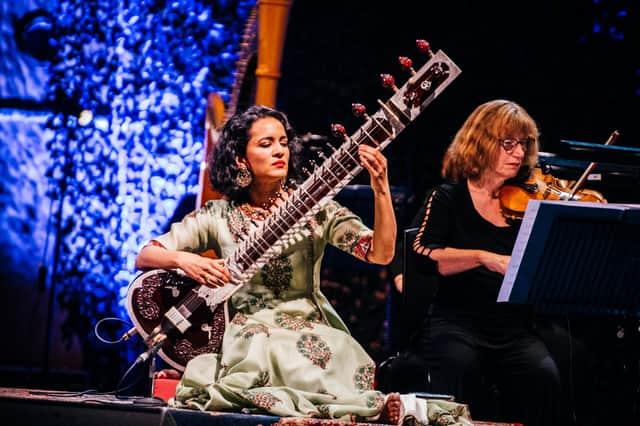Celtic Connections review: Anoushka Shankar & the SCO and Orchestral Qawwali Project, Glasgow Royal Concert Hall


Anoushka Shankar and the SCO, Glasgow Royal Concert Hall ****
It’s a thought that Sufi devotional music, with its origins in the 13th century, can prompt a standing ovation half-way through a Celtic Connections concert.
Advertisement
Hide AdAdvertisement
Hide AdSuch, however, was the emotive power of Abi Sampa's singing, leading the ten-strong Orchestral Qawwali Project, the effect of whose responsive vocals and percussive hand-clapping, could be near trance-inducing.
Traditionally this ancient, transcendent Islamic praise was sung only by men and without instrumentation, so here were taboos broken cheerfully on two counts, Sampa being apparently the UK’s first female Qawwali singer and accompanied not only by the group’s composer, Rushil, on piano and tabla player Amrit Dhuffer, plus guitars, harmonium and cello, but by the Scottish Chamber Orchestra under conductor Clark Mundell.
Sampa’s microtonally imploring vocals and eloquent gestures were answered and urged on by the other singers, with an intensity which made one wonder whether it really needed orchestral accompaniment. We may have had no idea of what she was singing but there was something hugely moving about it.
There were no linguistic barriers to fully appreciating Anoushka Shankar’s performance of the Concerto No 3 for Sitar and Orchestra, composed by her father, the late Pandit Ravi Shankar. Vividly toned and textured music, it opened with pizzicato strings and staccato woodwind before harp chimes introduced the glittering voice of the sitar – sighing, ringing or querulously chattering by turns.
This musical conversation was a dynamic one, the orchestra sometimes playing in unison with the sitar, sometimes answering back or providing a sweeping backdrop.
The second movement saw slow, meditative deliberations on Shankar’s part, over a drone provided by strings and woodwind, while the finale saw the sitar racing over terse orchestral strokes to an animated finale. As cross-cultural musical colloquy goes, this was a happy one.
A message from the Editor:
Thank you for reading this article. We're more reliant on your support than ever as the shift in consumer habits brought about by coronavirus impacts our advertisers.
If you haven't already, please consider supporting our trusted, fact-checked journalism by taking out a digital subscription at https://www.scotsman.com/subscriptions